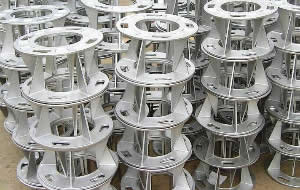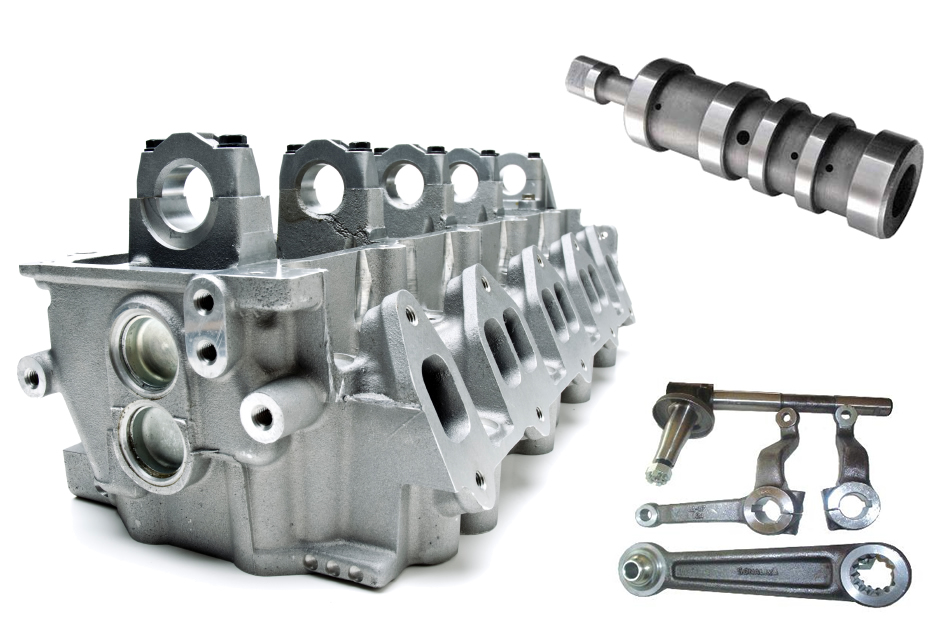The Duty of Aluminum Foundries beforehand Lightweight Manufacturing Solutions
Light weight aluminum factories substantially add to the advancement of lightweight production options. Their cutting-edge casting modern technologies produce high-strength, light-weight components crucial for markets like auto and aerospace. This advancement not just boosts product performance yet additionally promotes sustainability with using recycled materials. As these factories adjust to emerging modern technologies and practices, they lead the way for future developments in producing effectiveness and ecological obligation. What lies in advance in this transformative trip?
The Benefits of Lightweight Products in Production
As sectors significantly seek performance and sustainability, the fostering of light-weight materials in production has actually become an essential method - Aluminum Foundry. These products, especially light weight aluminum and compounds, use numerous benefits that improve manufacturing processes and product efficiency. Largely, their minimized weight contributes to lower power usage throughout transport and operation, bring about significant cost savings
Lightweight products help with the style of even more complex geometries, permitting for higher innovation in item growth. This versatility commonly leads to improved functionality and performance, dealing with the developing demands of modern-day consumers.
Furthermore, using light-weight materials can improve the longevity of products as a result of their resistance to rust and fatigue. This resilience not only decreases maintenance prices yet additionally sustains sustainability campaigns, as longer-lasting products add to much less waste. To summarize, the benefits of light-weight materials are crucial in driving performance, technology, and ecological responsibility in production.
Developments in Light Weight Aluminum Spreading Technologies
Current innovations in light weight aluminum casting technologies are revolutionizing the manufacturing landscape, particularly in the production of lightweight elements. Technologies such as high-pressure die casting and vacuum pass away casting have actually significantly enhanced the precision and surface area finish of light weight aluminum components - Aluminum Foundry. These approaches permit for the creation of complicated geometries while reducing product waste and improving mechanical residential or commercial properties

Additionally, the execution of real-time monitoring systems assures top quality control throughout the spreading process, resulting in even more regular item results. Collectively, these developments not just improve the performance of light weight aluminum elements but also support the industry's shift in the direction of even more lasting manufacturing methods.
Applications of Aluminum Parts in Numerous Industries
While light weight aluminum parts have long been used in various markets, their convenience and lightweight buildings proceed to drive ingenious applications throughout sectors such as automotive, aerospace, and building. In the automotive sector, aluminum is progressively utilized for engine blocks, wheels, and body panels, boosting gas efficiency and efficiency. Aerospace producers take advantage of aluminum for aircraft structures and components, taking advantage of its strength-to-weight ratio to boost gas economic situation and haul capability.
In the building and construction market, aluminum is preferred for window frameworks, roof, and architectural elements, supplying durability and resistance to corrosion while lowering total building weight. Furthermore, the electric and electronics markets gain from light weight aluminum's conductivity and light-weight nature, utilizing it in circuitry, rooms, and warm sinks. These varied applications highlight the essential function of light weight aluminum components, which try these out not just meet market demands but likewise add to developments in item design and performance across multiple fields.
Sustainability and Power Performance in Aluminum Foundries
The aluminum foundry sector plays an essential function in advertising sustainability and energy performance, particularly as need for light-weight components continues to expand throughout different industries. Foundries are increasingly embracing eco-friendly methods, such as utilizing recycled aluminum, which substantially lowers power intake and greenhouse gas emissions contrasted to primary aluminum manufacturing.
In addition, improvements in casting modern technologies improve power performance by optimizing the melting procedures and lowering waste. Methods like die spreading and investment casting permit exact material usage, minimizing excess and scrap.
Additionally, numerous factories are purchasing renewable resource resources to power procedures, better reducing their carbon impact. Applying energy monitoring systems allows factories to improve and keep an eye on power usage, ensuring they operate at peak efficiency.

Future Trends in Lightweight Manufacturing Solutions
How will arising modern technologies shape the future of lightweight production options? Advancements such as advanced materials, automation, and additive manufacturing are readied to redefine production procedures. The assimilation of clever manufacturing innovations, including the Net of Points (IoT) and fabricated intelligence (AI), will allow real-time tracking and optimization, enhancing efficiency and lowering waste.

As sustainability remains to be a paramount problem, light-weight options will increasingly concentrate on reusing and reusing materials, lining up with round economic situation principles. This development in light-weight production will not just enhance item performance however likewise add to ecological objectives, ensuring that the sector remains affordable in a swiftly transforming market landscape.
Frequently Asked Inquiries
Exactly How Do Aluminum Foundries Make Certain Quality Assurance in Production?
Light weight aluminum factories assure quality assurance in production via extensive screening, standardized treatments, and constant tracking - Aluminum Foundry. They apply sophisticated modern technologies and experienced personnel to maintain uniformity, decrease defects, and satisfy sector standards throughout the production process
What Are the Key Tests Dealt With by Light Weight Aluminum Foundries?
Aluminum shops encounter obstacles such as changing raw product costs, preserving production performance, guaranteeing constant top quality, adjusting to technical advancements, and conference environmental guidelines, every one of which impact their general functional performance and competition out there.
Just How Does Light Weight Aluminum Recycling Impact Factory Workflow?
Light weight aluminum recycling considerably improves foundry procedures by decreasing raw material costs, decreasing energy usage, and lowering environmental influence. This sustainable technique makes it possible for foundries to boost performance while satisfying enhancing demand for light-weight, high-performance aluminum products.
What Skills Are Needed for Workers in Light Weight Aluminum Foundries?
Workers in aluminum foundries need abilities in metallurgy, machining, quality assurance, and safety and security methods. Proficiency in running equipment, recognizing alloy residential or commercial properties, and analytical are additionally essential for reliable manufacturing and maintaining high safety standards.
How Do Light Weight Aluminum Foundries Deal With Waste Monitoring?
Light weight aluminum shops manage waste via recycling scrap metal, utilizing efficient waste segregation strategies, and sticking to ecological guidelines. They implement sustainable techniques to minimize land fill contributions, guaranteeing that unsafe materials are dealt with responsibly.
Light weight aluminum foundries substantially contribute to the development of light-weight manufacturing services. Recent improvements in light weight aluminum casting technologies are you can look here changing the manufacturing landscape, specifically in the production of lightweight components. While light weight aluminum components have long been used in various industries, their versatility and lightweight homes continue to drive cutting-edge applications across markets such as auto, aerospace, and building. In addition, the electric and electronic devices markets profit from aluminum's conductivity and light-weight nature, using it in wiring, units, and heat sinks. The aluminum factory market plays a crucial function in promoting sustainability and power effectiveness, particularly as demand for lightweight components continues to grow across different markets.